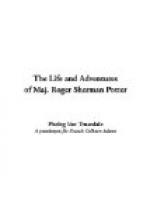“They had now staggered among some laurel bushes at the side of the road, when the doctor, having inquired if the parson meant anything personal, and not receiving an immediate answer, fetched him a blow that felled him to the ground, and almost simultaneously followed him. And now so great was his fear of having done him bodily injury, that he seized him in his arms, and, thus embraced, they had slept until I disturbed them. Each now commenced giving a confused version of the affair, criminating and recriminating in a manner that only served to increase the disgrace to which it attached. The doctor protested his innocence of the deed, while the parson continued to discant upon the consequences that would result from the disfiguration of his features. At the same time they both intimated their readiness to have me sit in judgment upon their affairs, and accept my decision as final.
“When they had put on their hats I bid them sit down upon a moss-covered hillock, and hold their peace. Having done this with great good nature, I seated myself on an opposite one, and commenced to deliberate upon their case. The state of debility in which they had unfortunately found themselves on the previous night must, doubtless, be put down to the strength of the cider. The debility, then, being acknowledged, neither could be held accountaable to the other for acts committed while morally insane. As to the imputation cast upon the medical profession by the parson, even were it done when the mind was morally sane, it ought only to be set down to the natural envy existing among members of different professions, and was much to be deplored, for instead of one being ambitious to claim a superiority over the other, they ought to regard themselves coworkers in equally good causes, and for the advancement of a common humanity. In order to settle the questions they had attempted to debate, I proposed that they adopt the rule laid down by our noisy Congressmen, each being satisfied in his own mind that he had demolished the arguments of the other, and for ever settled the question at issue. The battering they had given each other was a thing of the past. Was it not better then to let a bygone be a bygone, rather than seek a technical satisfaction, that while it afforded the public some amusement would only bring themselves a great deal of pain? They could no more recall the past than they could make a set of rules for governing the appetites of the people. There were always simpletons enough to believe that they could be cured of consumption by taking such nostrums as cod liver oil and Wistar’s Balsam; so also would the world always be pestered with men simple enough to believe that every man must square his inclinations to the measure of their own. But one point now remained to be deliberated upon, and that was how the doctor should atone to the parson for his damaged face. I, however, soon overcame this, by suggesting that it would be no more than




